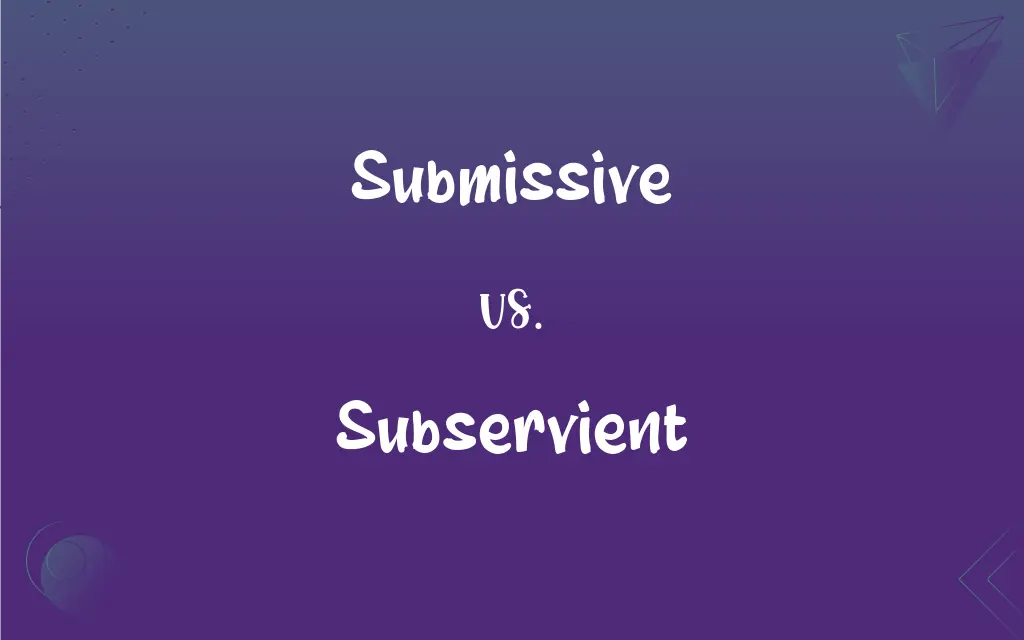Submissive vs. Subservient: What's the Difference?
Edited by Janet White || By Harlon Moss || Updated on November 7, 2023
Submissive means yielding to authority, while subservient suggests a lower status, serving others often in an obsequious way.

Key Differences
Submissive refers to a willingness to yield to the authority or will of others. It implies a voluntary act of deferring to others, often out of respect or a desire to maintain harmony. Subservient, however, goes beyond this, implying an excessive willingness to act in accordance with someone else's orders or wishes, often to the point of being obsequious or excessively compliant.
The submissive nature of an individual might be a personal trait, where one shows a preference for a passive role within a relationship or social structure. Subservient behavior, though, suggests a forced or expected compliance within a hierarchy, where individuals lower in status are expected to serve or obey those above them without question.
In submissive relationships, the control is often handed over by the submissive party as part of trust or agreement, like in certain consensual hierarchies or power dynamics. Subservient behavior can often be found in situations where one person has to follow orders or serve others due to their position, job, or societal expectations, sometimes unwillingly.
Being submissive doesn’t necessarily mean one holds a lower status; it could simply indicate a personality type that avoids confrontation. Conversely, being subservient can denote a lower rank or standing, often with the connotation of inferiority or underestimation in capabilities or importance.
In essence, while both terms deal with deference to authority or another person, submissive often has a psychological or emotional aspect, often within a chosen dynamic. Subservient, in contrast, has a social or structural aspect, relating to one’s lower status or role as a server or attendant, often associated with power imbalances.
ADVERTISEMENT
Comparison Chart
Implication
Voluntary yielding
Lower status, obliged service
Connotation
Passive, cooperative
Inferior, often obsequious
Social Dynamics
May choose to submit
Often expected to serve
Relationship to Power
Personal power dynamic
Structural hierarchy
Emotional Component
Can be consensual
Often linked to necessity
ADVERTISEMENT
Submissive and Subservient Definitions
Submissive
Ready to conform to the authority or will of others.
She was submissive to her mentor's guidance.
Subservient
Expected to serve the needs or purposes of others.
As an intern, she felt subservient to the rest of the staff.
Submissive
Showing a willingness to submit without resistance.
The submissive dog rolled over to show its belly.
Subservient
Excessively willing to serve or please others.
His subservient manner was apparent as he bowed his head whenever addressed.
Submissive
Compliant with the commands or guidance of others.
The employees were submissive to the new policies.
Subservient
Less important; subordinate.
The committee's interests were subservient to those of the board.
Submissive
Not resisting control or opposition.
He was submissive during the negotiation, not offering any objections.
Subservient
Prepared to obey others unquestioningly.
The subservient staff catered to every whim of the celebrity.
Submissive
Ready to adapt oneself to the convenience of others.
In the debate, she was submissive and avoided conflict.
Subservient
Under the authority or control of another.
The assistant played a subservient role in the office hierarchy.
Submissive
Inclined or willing to submit.
Subservient
Subordinate in capacity or function.
Submissive
Obedient or passive.
Submissive
(BDSM) One who submits to a dominant partner in BDSM practices.
FAQs
What does it mean to be subservient?
It means showing a willingness to serve or please others, often implying lower status.
Are submissive individuals always weak?
No, submission can be a chosen dynamic that doesn't necessarily denote weakness.
What is the role of consent in submission?
Consent is crucial; submission should be a voluntary and respected choice.
Is subservient behavior always negative?
Not always, but it often has negative connotations of excessive obedience.
What defines a submissive person?
Someone who willingly yields to others' authority or wishes.
Can someone be submissive by nature?
Yes, it can be an inherent personality trait.
Is subservience always linked to employment or service roles?
Often, but it can apply to any situation where one is expected to serve.
How does one stop being subservient?
Through self-assertion, setting boundaries, and possibly changing social dynamics.
Can one be submissive without being subservient?
Yes, one can voluntarily submit without being in a lower status.
Is being subservient a personality flaw?
Not inherently, though it can be problematic if it leads to exploitation.
Does being subservient require a context of servitude?
Typically, it implies serving others due to a position or role.
Can subservient actions be voluntary?
They can be, but often suggest obligations due to a role or hierarchy.
Are there healthy forms of being submissive?
Yes, when it's part of consensual and respectful relationships.
Can a dominant person also be submissive?
Yes, someone can exhibit both traits in different contexts or relationships.
Are subservient individuals always content with their role?
Not always; contentment can depend on personal values and the nature of the subservience.
Can submissive tendencies change?
Yes, people may become more or less submissive due to experiences or personal growth.
Are subservient people always aware of their status?
Not necessarily; awareness can vary depending on individual perception.
Does society value submissive or subservient behaviors?
It varies by culture and context, with some valuing it and others discouraging it.
Does subservience affect self-esteem?
It can, especially if it is unwanted or forced.
Can submissive people hold positions of authority?
Yes, they can separate their personal dynamics from professional roles.
About Author
Written by
Harlon MossHarlon is a seasoned quality moderator and accomplished content writer for Difference Wiki. An alumnus of the prestigious University of California, he earned his degree in Computer Science. Leveraging his academic background, Harlon brings a meticulous and informed perspective to his work, ensuring content accuracy and excellence.
Edited by
Janet WhiteJanet White has been an esteemed writer and blogger for Difference Wiki. Holding a Master's degree in Science and Medical Journalism from the prestigious Boston University, she has consistently demonstrated her expertise and passion for her field. When she's not immersed in her work, Janet relishes her time exercising, delving into a good book, and cherishing moments with friends and family.








































































